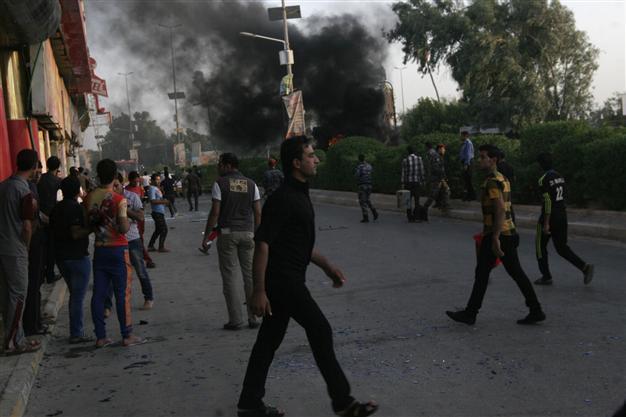Iraq attacks death toll rises to 57
BAGHDAD - Agence France-Presse

Civilians gather at the site of a car bomb attack in Amara, 300 km southeast of Baghdad, July 2, 2013. REUTERS/Salah Thani
The death toll from a wave of attacks in Iraq mostly targeting Shiites in packed markets rose to 57, officials said Wednesday, marking a second day of brutal violence against the sect.
A series of bombings and shootings on Monday and Tuesday have left more than 100 people killed and upwards of 280 wounded, the latest in spiralling violence that has sparked fears of renewed all-out sectarian war.
It has coupled with a protracted political stand-off and months of anti-government protests by the Sunni Arab community, with analysts warning the deadlock is unlikely to be resolved at least until general elections due next year.
No group immediately claimed responsibility for the bloodshed, but Sunni militants linked to Al-Qaeda often target Shiites, whom they regard as apostates.
The worst of Tuesday's violence hit Baghdad, with at least six car bombs hitting markets and commercial areas in predominantly Shiite neighbourhoods, leaving 42 people dead and more than 100 wounded.
Vehicles rigged with explosives went off at around 6:00 pm in Shuala, Kamaliyah, Shaab, Hurriyah and Abu Tcheer districts.
Car bombs also went off in the predominantly Shiite southern cities of Basra, Amara and Samawa, killing a total of three people.
Shootings elsewhere in Baghdad killed four more people, while bombings in the cities of Abu Ghraib, Kirkuk, Baquba and Mosul killed eight people and wounded 24.
Tuesday's violence came a day after a series of attacks north of Baghdad left 49 people dead, among them 23 people killed in a suicide bombing at a funeral in a Shiite religious hall.
The United Nations has said that more than 2,500 people were killed in a surge of violence from April through June.
Figures compiled by AFP showed the death toll from April through June was more than twice that of the first three months of the year.
Attacks in recent months have targeted a wide cross-section of Iraqi society -- government buildings and security forces were hit by car bombs, mosques were struck by suicide attackers, anti-Qaeda militiamen were shot dead, and Iraqis watching and playing football were killed by blasts.
The surge in violence comes amid a protracted political standoff within Iraq's national unity government. While political leaders have pledged to resolve the dispute, with Prime Minister Nuri al-Maliki meeting his two main rivals last month, no tangible measures have been agreed.
Meanwhile, tensions have continued along a swathe of disputed territory in north Iraq, and months of protests among the Sunni Arab community have continued unabated.
Analysts and diplomats worry that the multi-faceted standoffs are unlikely to see any long-term resolution at least until a general election due next year.
